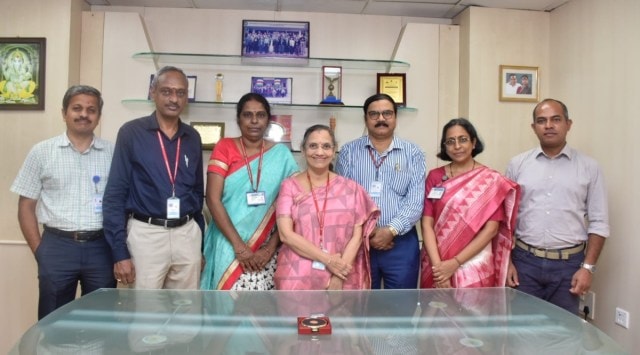Click here to join Express Pune WhatsApp channel and get a curated list of our stories
Multi-country LPG trial shows drop in air pollution exposures, but insignificant impact on birth weight
Exposure to household air pollution caused by the burning of solid biomass fuel during pregnancy is associated with adverse health outcomes, including low birth weight.
 India Author Team Picture (L to R: Dr. Thangavel G, Dr. Sambandam S, Dr. Aravindalochanan V, Dr. Kalpana Balakrishnan, Dr. MukhoPadhyay K, Dr Sarada S Garg Dr. Puttaswamy, N). (Express Photo)
India Author Team Picture (L to R: Dr. Thangavel G, Dr. Sambandam S, Dr. Aravindalochanan V, Dr. Kalpana Balakrishnan, Dr. MukhoPadhyay K, Dr Sarada S Garg Dr. Puttaswamy, N). (Express Photo)THE BIRTH weight of infants did not differ significantly between those born to women who used Liquified Petroleum Gas (LPG) cook stoves, and those born to women who used biomass cook stoves, results from one of the largest multi-country trials have found. Published on Monday in the New England Journal of Medicine, the Household Air Pollution Intervention (HAPIN) trial assessed the impact of an 18-month LPG intervention on health in India, Guatemala, Peru, and Rwanda among 3,200 pregnant women and 200 older adult women.
“LPG intervention reduces air pollution exposures and these programmes have potential to make improvements in air pollution for rural populations in India to achieve future health gains. However, that alone cannot make a difference in birth outcomes among poor populations and multiple risk factors need to be addressed simultaneously,” ‘Professor Kalpana Balakrishnan, Dean (Research) and Director of the ICMR Center for Advanced Research on Air Quality, Climate and Health at Sri Ramchandra Institute of Higher Education and Research (SRIHER), Chennai, and India team lead for the multi country study told The Indian Express.
Exposure to household air pollution caused by the burning of solid biomass fuel during pregnancy is associated with adverse health outcomes, including low birth weight. Low birth weight (<2500 g) remains a major public health challenge, particularly in low-income and middle-income countries. Whether the replacement of a biomass cook stove with a liquefied petroleum gas (LPG) cookstove would result in an increase in birth weight is unclear. In India and many low- and middle-income countries are promoting liquefied petroleum gas (LPG) as an alternative source of energy for cooking and heating, in some cases subsidising the cost at considerable government costs.
Between May 7, 2018, and February 29, 2020, at least 3,200 pregnant women (9 to 20 weeks gestation)—800 each from India, Rwanda, Guatemala and Peru—were randomised on a 1:1 basis, either to receive a free LPG stove and fuel or to serve as controls that continued to cook on traditional stoves with biomass. “We measured stove use and the pregnant woman’s exposure to air pollution throughout the gestation period. In India, the trial was conducted in Kallakurichi and Nagapattinam districts of Tamil Nadu. Despite the challenge of Covid shutdowns and government restrictions–and the tendency of householders to continue to use traditional stoves and fuel even when they have access to cleaner fuels—we were able to continue the trial and achieve nearly exclusive use of the LPG stoves by the intervention arm throughout the follow up period,” Dr Balakrishnan said.
`Personal exposure to fine particulate matter (PM 2.5) in the intervention group was consistently lower than the WHO Interim Guideline value of 35 μg/M 3 . No other trial to date has been able to accomplish such consistent and sustained reductions across multiple countries. Despite the reduction in exposure to air pollution, the birth weight of infants did not differ significantly between those born to women who used LPG cookstoves and those born to women who used biomass cook stoves, study researchers from SRIHER said.
The study was led by Emory University, Johns Hopkins University, and Colorado State University in the US in collaboration with investigators from more than a dozen institutions and funded by the US National Institutes of Health and the Bill and Melinda Gates Foundation. Prof Thomas Clasen from Emory University, Atlanta, the main author of the study, Liquefied Petroleum Gas or Biomass for Cooking and Effects on Birth Weight, has noted in the report that the difference in birth weight of infants born to women in the intervention group and control group was just 19.5 g and not statistically significant.
While PM 2.5 exposures were significantly lower among the intervention group, they were still more than seven-fold higher that the recently issued WHO guideline values. Findings suggest that even lower levels may be needed to achieve benefits on birth weight. More than a third of the global population – about 3 billion people – rely on solid biomass (wood, charcoal, dung and agricultural residue) for cooking. The resulting household air pollution is a leading environmental risk factor, accounting for an estimated 2.3 million deaths annually (0.6 million deaths were attributable to household air pollution exposures in India in 2019).
There was suggestive evidence that intervening earlier in gestation may be protective: infants born to women who received the intervention at less than 18 weeks’ gestation were 33.8 gm heavier than those born to women who received the intervention at a later time. This suggests the length of the intervention may not have been sufficient and it may be necessary to reduce exposures throughout pregnancy and perhaps even prior to conception. It is important to note that the study population in India had a higher than average prevalence of low birth weight pointing out to the need for addressing the role of multiple risk factors for low birth weight in poor populations while scoping intervention programmes, Dr Balakrishnan said.
Click here to join Express Pune WhatsApp channel and get a curated list of our stories








